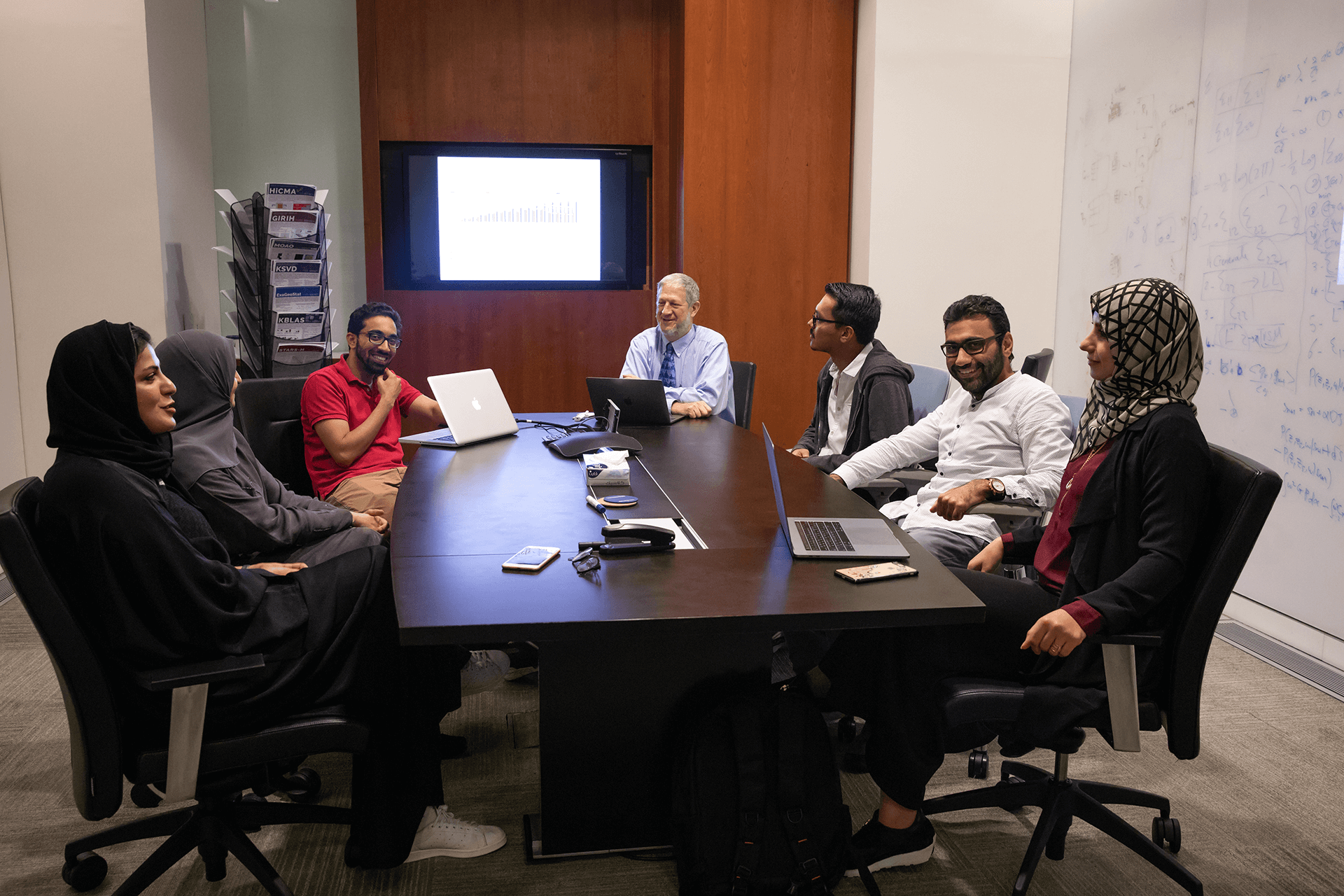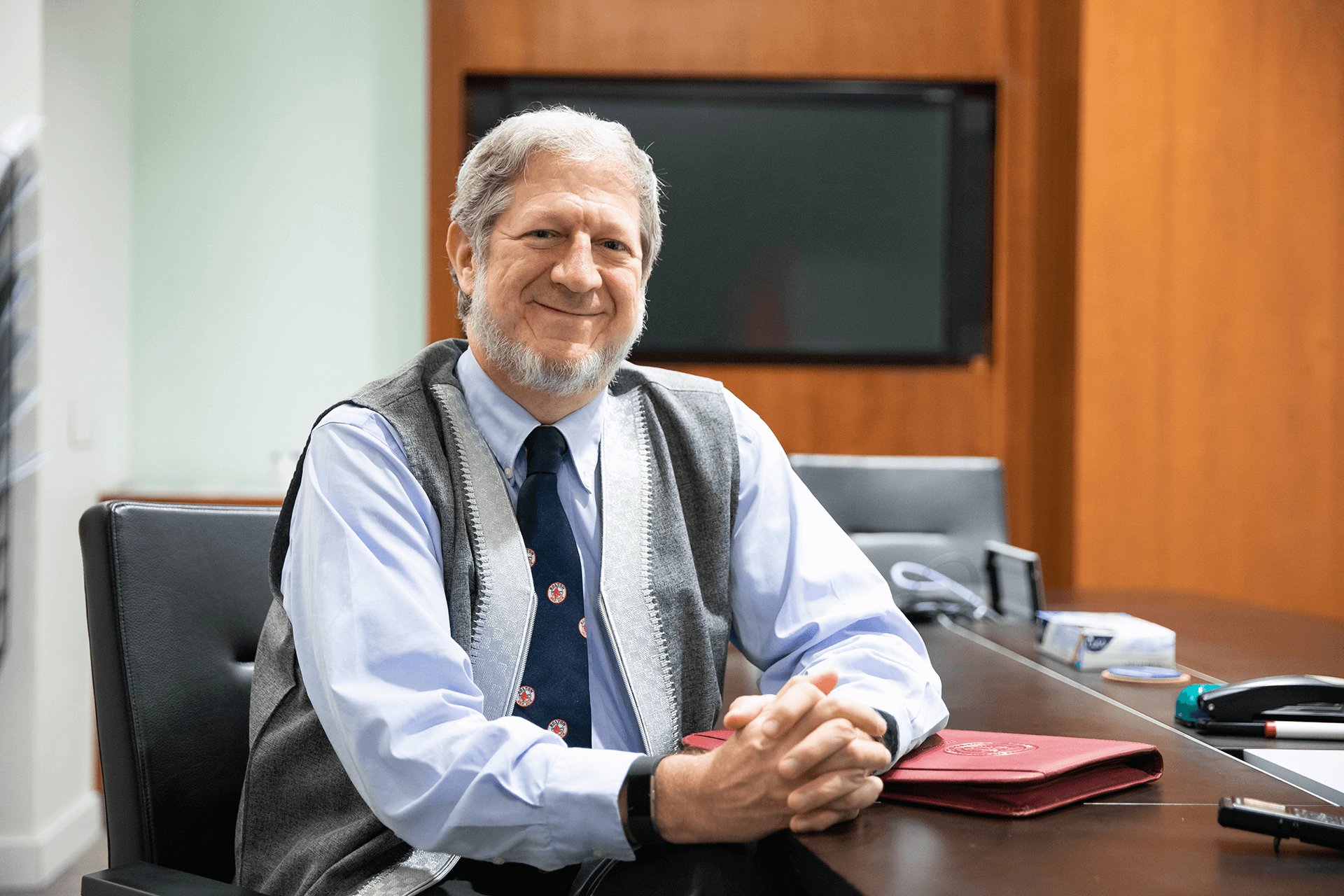KAUST gets ready for SC18

Director of the KAUST Extreme Computing Research Center David Keyes (pictured here with his students) will chair the technical program of the International Conference for High Performance Computing, Networking, Storage, and Analysis in the U.S. in November. Photo by Sarah Munshi.
By Lulwah Shalhoub, KAUST News
For the past 10 years, KAUST has made a strong presence at the International Conference for High Performance Computing, Networking, Storage, and Analysis (SC) that takes place in different cities around the U.S. every year. 2018 will mark a special year for KAUST at SC, which will take place in Dallas, Texas, in November, with around 13,000 supercomputing professionals in attendance. The University will have an engaging presence on the exhibition floor and in the seminars, and the technical program of SC18 will be chaired by the Director of the KAUST Extreme Computing Research Center (ECRC) David Keyes.
Since his role was announced last year before SC17 in Denver, Colorado, Keyes has been working on bringing out the best in the world of high performance computing (HPC) for the top-tier event in the world of computer science. Approximately 420 professional volunteers and 160 student volunteers are engaged in the technical program under Keyes, which runs in parallel with a large commercial exhibition program.
"We continue to boost the rigor of the reputation of SC18 this year," Keyes said.
"For each of the last three years, we have tightened the screws on the quality of the conference, and I am happy to contribute to this trend. We are in our third year of double-blind reviews; our second year of reproducibility appendices; and our first trial of a journal-style double-round review process, compacted within the time-scale of a conference with a proceedings deadline. We asked a lot of our reviewers' time in adding our own signature this year," he added.

David Keyes, director of the University's Extreme Computing Research Center, is working to bring out the best of high performance computing at the International Conference for High Performance Computing, Networking, Storage, and Analysis in the U.S. in November. Photo by Sarah Munshi.
Since the 25th anniversary meeting in 2013, SC organizers have looked back at previous conferences to identify papers that became influential. The SC Test of Time Award is given to a paper that is at least 25 years old and still retains its citation impact year after year. Furthermore, every five years—including in 2018—supercomputing overall is examined in a comprehensive manner at the conference. This year, there will be a panel including all the living general chairs from past conferences who will comment on how the conference has evolved with supercomputing.
During SC17, the University's supercomputer Shaheen II was recognized as one of the fastest supercomputers in the world and the fastest in the Middle East. It is expected to retain the latter title at SC18. Every 10 years, supercomputers get 1,000 times faster. The University's supercomputer Shaheen I was replaced after six years with a supercomputer that was 30 times faster.

The University's supercomputer Shaheen II has been recognized as one of the fastest supercomputers in the world and the fastest in the Middle East. File photo.
"It is not only a question of keeping up with raw computing capability—it is also a question of energy efficiency. We have seen four orders of magnitude in energy efficiency accompanying six orders of magnitude in performance improvement over the past two decades," Keyes said.
KAUST expects again to update its supercomputer and will take the advantage of all the significant vendors at SC18.
"Our faculty here need [this]. Forty percent of the faculty here compute for a living. That is a much higher percentage than at any university I have ever heard of," Keyes noted.
This year's conference theme is "HPC [high performance computing] Inspires" and, from submissions, it will be a transitional year for the inclusion of data mining and machine learning in HPC.
Keyes believes that a convergence of big data and HPC will reduce acknowledged weaknesses in both areas.
"If we can build a common hardware-software environment for these two distinct research communities—which today they do not have—the predictive ability of both simulation and big data analytics will be transformed," he explained. "For example, a lot of simulation could be saved if analytics were done in situ on evolving simulations. You could pick your next case with more insight. It is not only a question of the application benefiting, but the performance of the algorithm could be tuned if we did machine learning on the computer itself while it was executing its application."

Director of the KAUST Extreme Computing Research Center David Keyes and a team of KAUST colleagues and students look forward to attending the International Conference for High Performance Computing, Networking, Storage, and Analysis in the U.S. in November. Image courtesy of Shutterstock.
KAUST typically sends several students to staff the KAUST exhibition booth, which is beneficial for students and the University. Keyes' last eight Ph.D. students received job offers before they defended their theses, often from people they met at the SC conference. The support provided to students in KAUST by faculty baseline funds allows them to commit to long-term issues.
"We [in KAUST] have a luxury that I have never had in my career before. I can tell a student to work on something whose main advantage will come with the advent of future computer architectures without [the] risk of having the plug pulled. Most of my colleagues take advantage of this both in student recruiting and in delivering impact," Keyes said.
"I have never had anywhere near as productive or as fun a period of my career as in the last five years here [at KAUST]. What you can bite off when you can think five years ahead is truly juicy," he added.
Related stories:
-
KAUST makes a distinctive presence at SC17
- KAUST Extreme Computing Research Center brings astronomy back home
- ANSYS, Saudi Aramco and KAUST achieve a new supercomputing milestone
-
First KAUST Hackathon and Second NVIDIA Workshop Bring Computing Talent to Campus
- At the forefront of programming models

